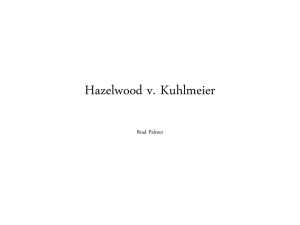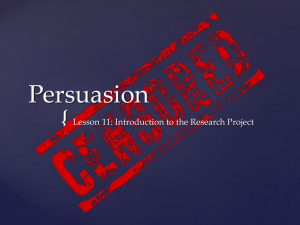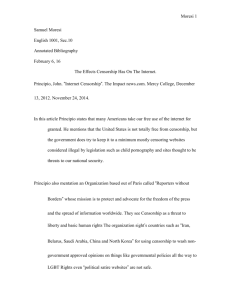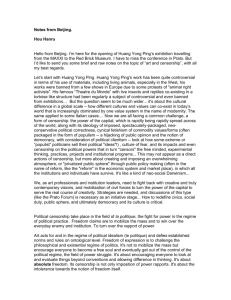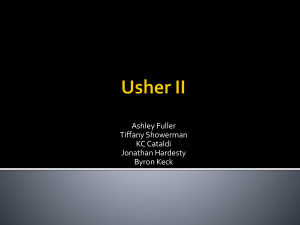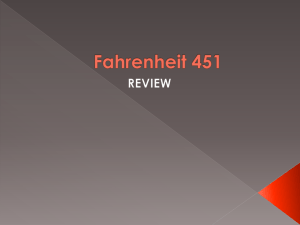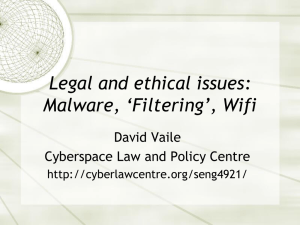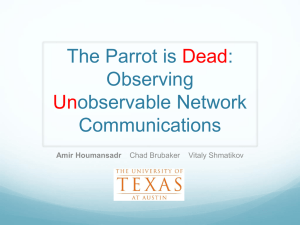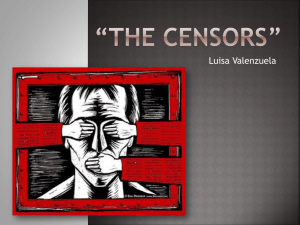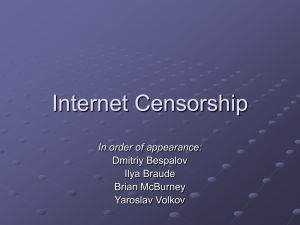New Perspectives on Censorship in Early Modern England
advertisement
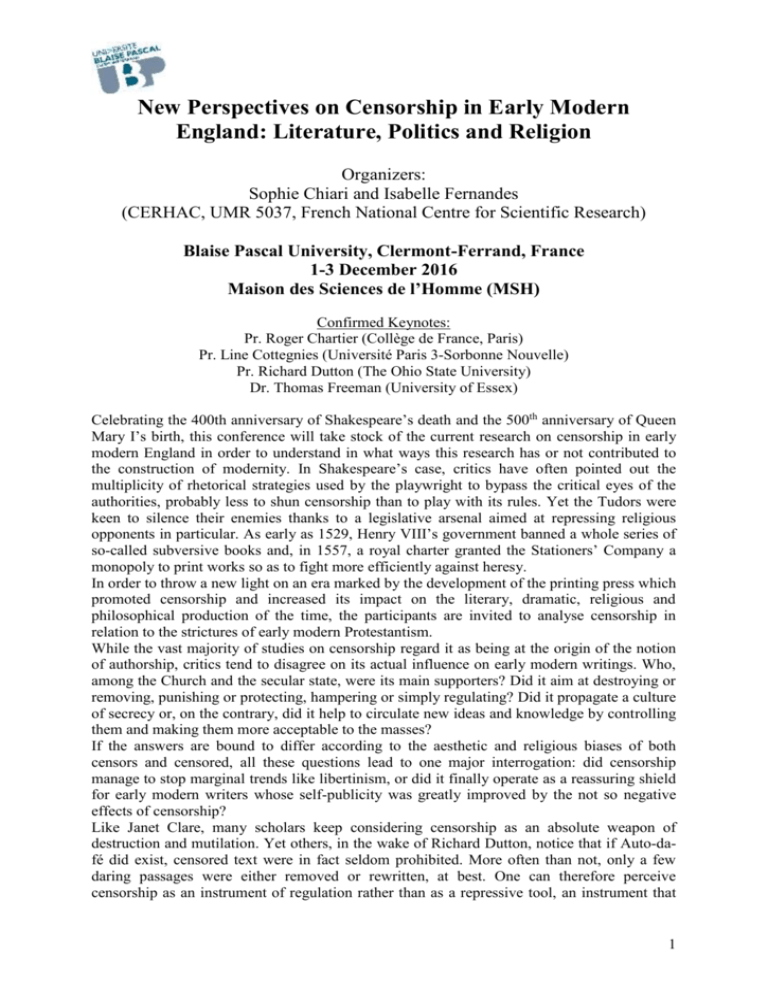
New Perspectives on Censorship in Early Modern England: Literature, Politics and Religion Organizers: Sophie Chiari and Isabelle Fernandes (CERHAC, UMR 5037, French National Centre for Scientific Research) Blaise Pascal University, Clermont-Ferrand, France 1-3 December 2016 Maison des Sciences de l’Homme (MSH) Confirmed Keynotes: Pr. Roger Chartier (Collège de France, Paris) Pr. Line Cottegnies (Université Paris 3-Sorbonne Nouvelle) Pr. Richard Dutton (The Ohio State University) Dr. Thomas Freeman (University of Essex) Celebrating the 400th anniversary of Shakespeare’s death and the 500th anniversary of Queen Mary I’s birth, this conference will take stock of the current research on censorship in early modern England in order to understand in what ways this research has or not contributed to the construction of modernity. In Shakespeare’s case, critics have often pointed out the multiplicity of rhetorical strategies used by the playwright to bypass the critical eyes of the authorities, probably less to shun censorship than to play with its rules. Yet the Tudors were keen to silence their enemies thanks to a legislative arsenal aimed at repressing religious opponents in particular. As early as 1529, Henry VIII’s government banned a whole series of so-called subversive books and, in 1557, a royal charter granted the Stationers’ Company a monopoly to print works so as to fight more efficiently against heresy. In order to throw a new light on an era marked by the development of the printing press which promoted censorship and increased its impact on the literary, dramatic, religious and philosophical production of the time, the participants are invited to analyse censorship in relation to the strictures of early modern Protestantism. While the vast majority of studies on censorship regard it as being at the origin of the notion of authorship, critics tend to disagree on its actual influence on early modern writings. Who, among the Church and the secular state, were its main supporters? Did it aim at destroying or removing, punishing or protecting, hampering or simply regulating? Did it propagate a culture of secrecy or, on the contrary, did it help to circulate new ideas and knowledge by controlling them and making them more acceptable to the masses? If the answers are bound to differ according to the aesthetic and religious biases of both censors and censored, all these questions lead to one major interrogation: did censorship manage to stop marginal trends like libertinism, or did it finally operate as a reassuring shield for early modern writers whose self-publicity was greatly improved by the not so negative effects of censorship? Like Janet Clare, many scholars keep considering censorship as an absolute weapon of destruction and mutilation. Yet others, in the wake of Richard Dutton, notice that if Auto-dafé did exist, censored text were in fact seldom prohibited. More often than not, only a few daring passages were either removed or rewritten, at best. One can therefore perceive censorship as an instrument of regulation rather than as a repressive tool, an instrument that 1 neither suppressed artistic creativity or subversive practices. Actually, early modern works were not dangerous per se: their hypothetical censorship depended on the way they were received by the audience who, in turn, shaped the conditions of their circulation. An apparently innocuous writing could therefore be turned into a subversive object years after its publication. A case in point is Shakespeare’s Richard II (c. 1595), which, in act 4, stages the deposition of a legitimate king. In the first three editions of the play, 164 lines related to Richard’s deposition were systematically erased. One had to wait for the publication of the 1604 quarto (and for the death of Elizabeth I) to see the full text published. This example shows that, between repression and laisser faire, a via media did exist. Anyway, there was probably no such thing as texts completely immune from censorship at the time, if one takes into account the often-underestimated importance of self-censorship. In this regard, Roger Chartier has shown that, in a number of early modern works, the dedicating epistle turned the dedicatee into a poet or into the first author of the work which he or she had patronized. Moreover, what turned out to be an incessant practice of revising suggests that a latent force of censorship kept refashioning the very substance of early modern texts. All in all, writing and censorship appear as two closely linked activities and, as has already been pointed out, if the birth of the author was more or less caused by the prevalence of censorship, the latter also contributed to the permanent blurring of the concept of authorship. This interdisciplinary symposium will thus endeavour to verify and possibly also challenge this hypothesis. Participants, moreover, will be expected to show how the bishops of London and Canterbury, the Stationers’ Company, and the Master of the Revels dealt with their prerogatives and implemented different forms of censorship. More generally speaking, the conference will reassess the contradictory shapes of censorship in early modern England in order to understand how they built the plural identity of the modern author. All approaches, be they literary, historical, religious, philosophical, or aesthetic, will be welcome. Please send a 300-word abstract and a brief bio-biblio to Sophie Chiari and Isabelle Fernandes : sophie.chiari@orange.fr isabelle.fernandes@gmail.com Deadline for proposal submission: 20 July 2015 Notification of acceptance: 30 September 2015 Conference dates: 1-3 December 2016 Paper presentations will be allocated 35 minutes including 10 minutes for questions and answers. Scientific Committee: Pr. Roger Chartier (Collège de France, Annenberg Visiting Professor of History at the University of Pennsylvania) Pr. Line Cottegnies (Paris 3-Sorbonne Nouvelle) Pr. Richard Dutton (The Ohio State University) Dr. Thomas Freeman (University of Essex) Pr. Pierre Lurbe (University of Paul Valéry-Montpellier 3) Pr. Ton Hoenselaars (Utrecht University) 2

